[Video] The 9 Causes of Aging, Episode 8, Stem Cells – with Dr. Guilhem Velvé Casquillas
Let us now turn to an eighth identified cause of aging: the depletion of our stem cells.
Stem cells: definition
Stem cells are undifferentiated or incompletely differentiated cells, i.e. they do not belong to a particular organ. They are able to generate specialized cells of this or that organ through cell differentiation. This mechanism allows them to acquire the characteristics specific to a cell type. Adult human stem cells cannot produce any type of cell. For example, our blood cells, such as red blood cells or platelets, form the basis of the same undifferentiated cells: hematopoietic stem cells. These stem cells are capable of becoming blood cells, but will not be able to become other specific cells such as muscle cells, or neurons…
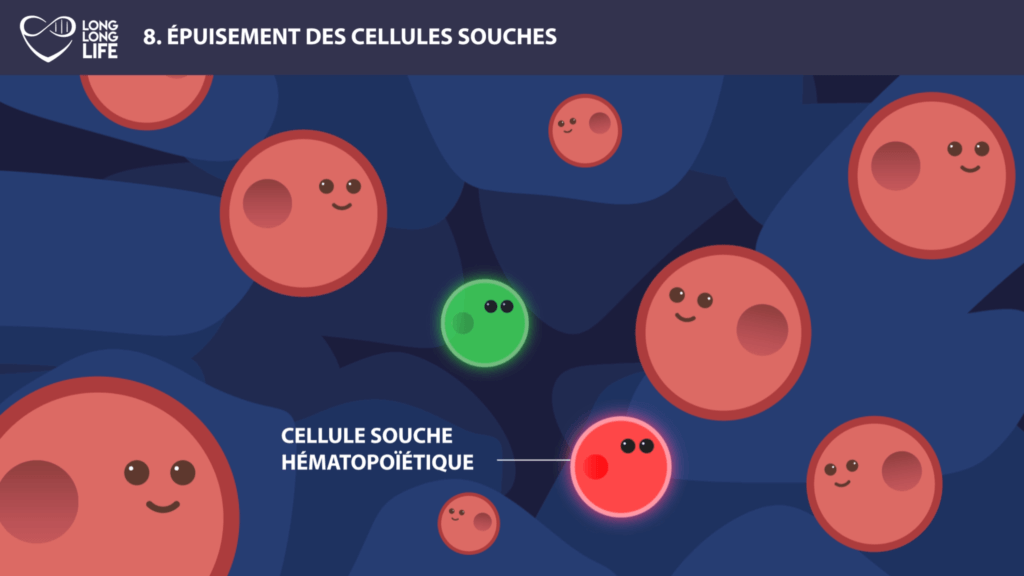
Stem cells allow the renewal of cells in an organ, they are stored in the body and are used when there is a need for cells: some cells age, die regularly and need to be replaced, such as red blood cells whose average lifespan is 120 days. Other organs can develop and require more tissue, such as the uterus, which grows during pregnancy.
In some animals, these cells allow the regeneration of a limb, as is the case with lizards. On the other hand, some organs do not contain a stem cell and therefore cannot be renewed in the event of damage. This is particularly the case with the heart and pancreas, which explains the problem in cases of heart attacks or diabetes: these organs are not able to recover from the problem.
Stem cells and cell renewal
Of course, stem cells themselves must be able to renew themselves. As we age, we observe that tissues have more difficulty regenerating. This is due, among other things, to the slowing down of cell divisions and the lack of stem cell replacement. This behaviour can be explained, according to current research, by the silent accumulation of damage in stem cells, particularly on their DNA. Moreover, although adult stem cells express telomerase, they are not immune to the narrowing of telomeres, the biological clock we have already mentioned (it’s all linked).
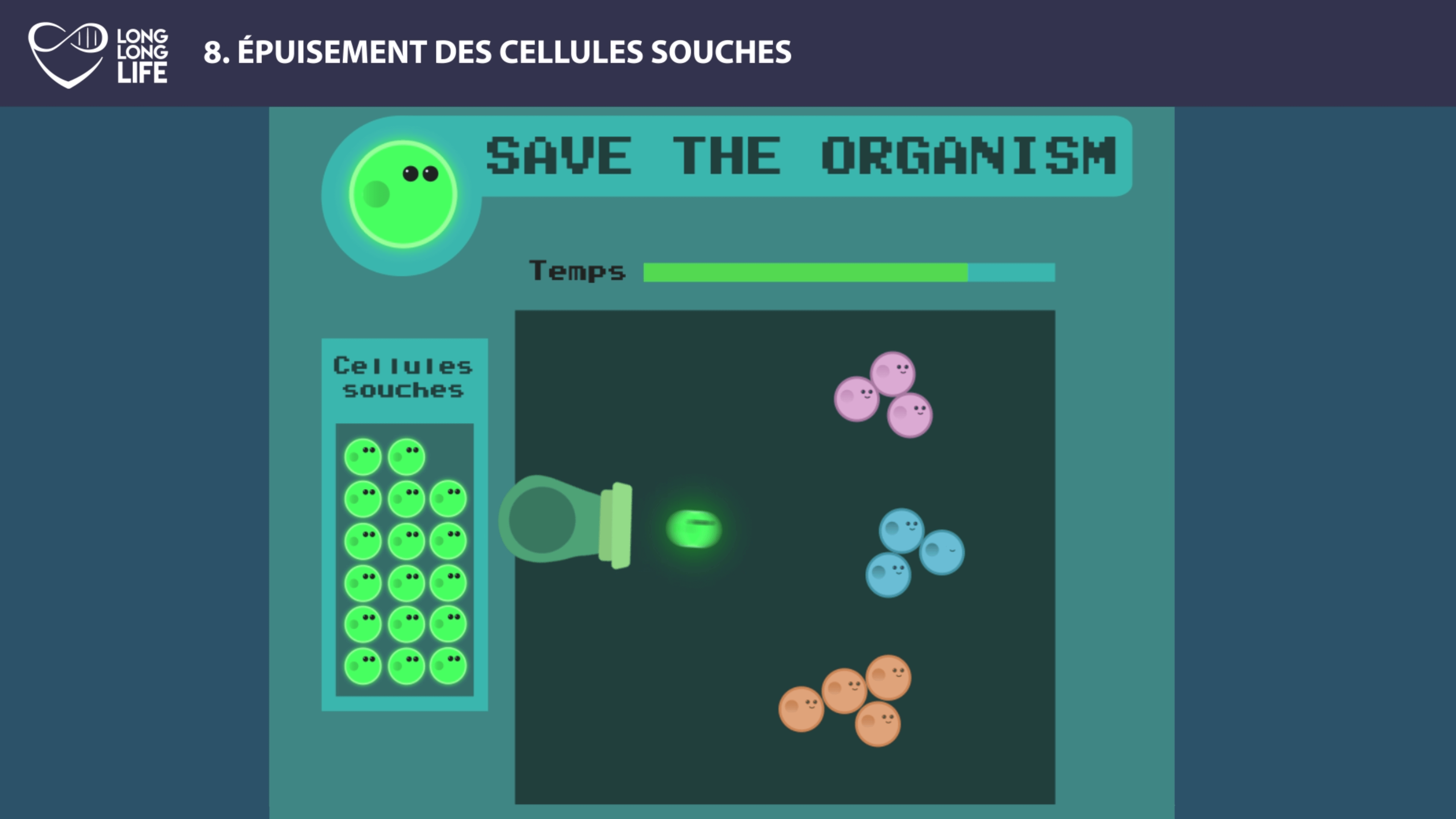
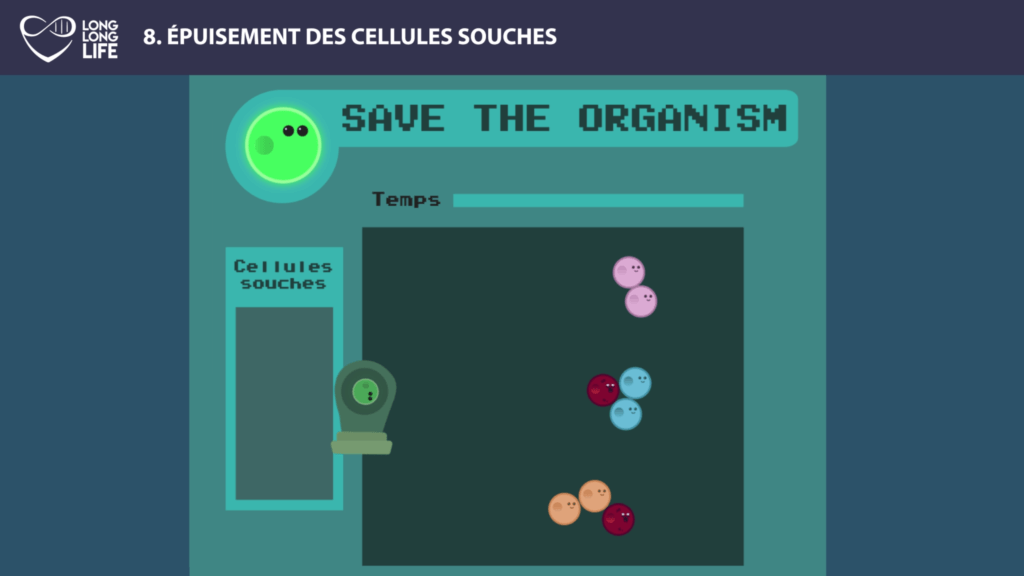
These phenomena make stem cells progressively rarer and therefore increase the number of senescent cells present in a tissue, and this can lead to different problems depending on the organs affected, as we have seen previously.
In addition to slowing down the production of stem cells, mutations in their DNA can appear, which can trigger cell death in some stem cells, or on the contrary modify their genetic information while increasing their replication rate or resistance. This can have an impact on the increase in cancers with age.

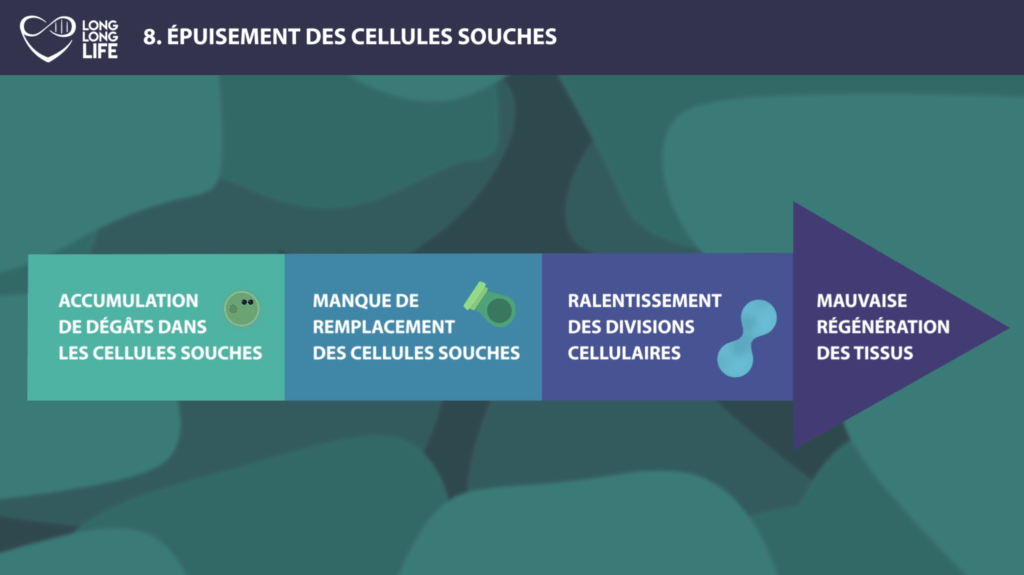
To sum it up, stem cell depletion is suspected to play a decisive role in the aging of the body, as it slows down cell renewal, thus making stem cell depletion an essential component in the aging process.
Dr Guilhem Velvé Casquillas

Author/Reviewer
Auteur/Relecteur
Physics PhD, CEO NBIC Valley, CEO Long Long Life, CEO Elvesys Microfluidic Innovation Center
More about the Long Long Life team
Docteur en physique, CEO NBIC Valley, CEO Long Long Life, CEO Elvesys Microfluidic Innovation Center
En savoir plus sur l’équipe de Long Long Life

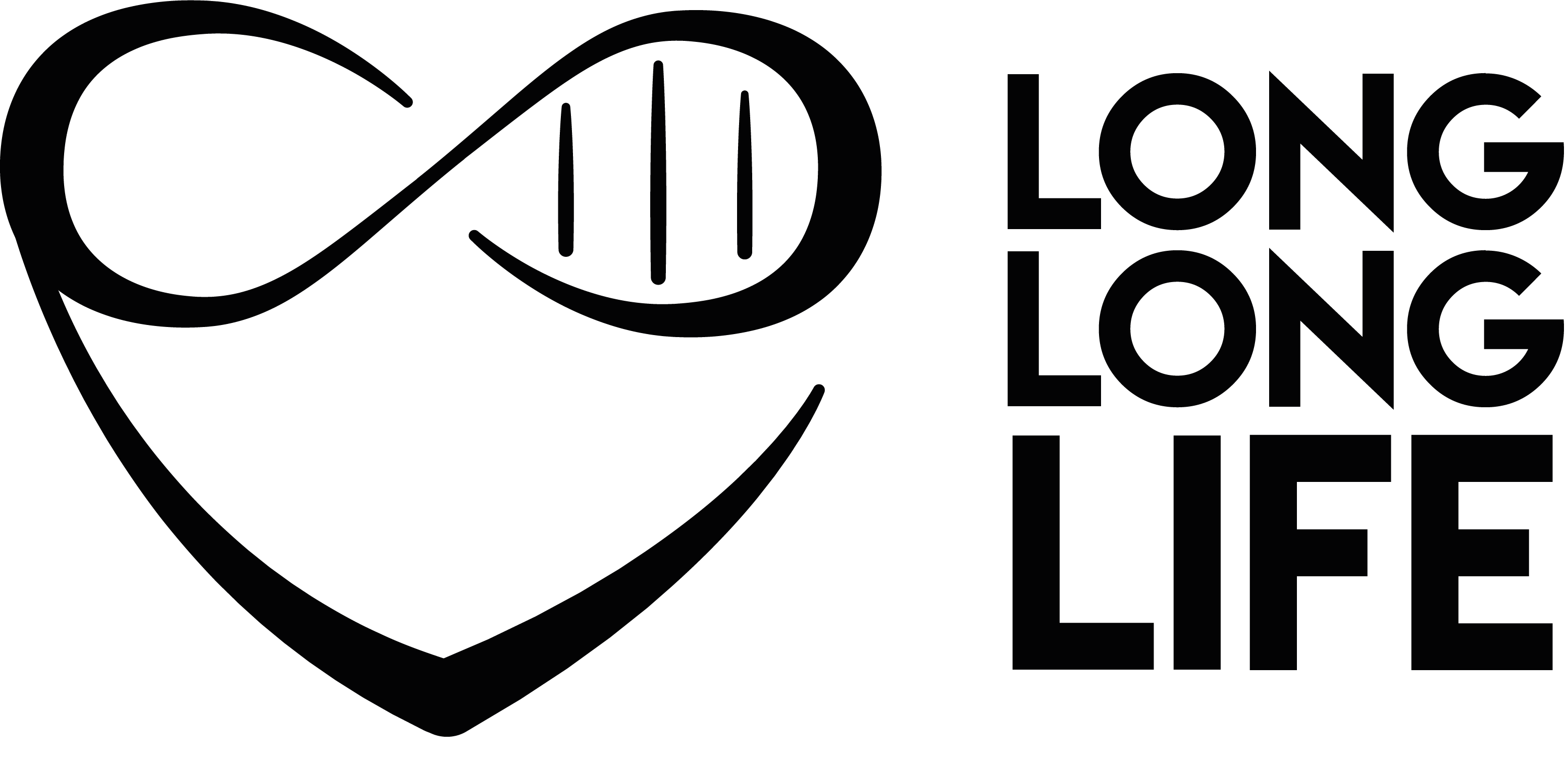
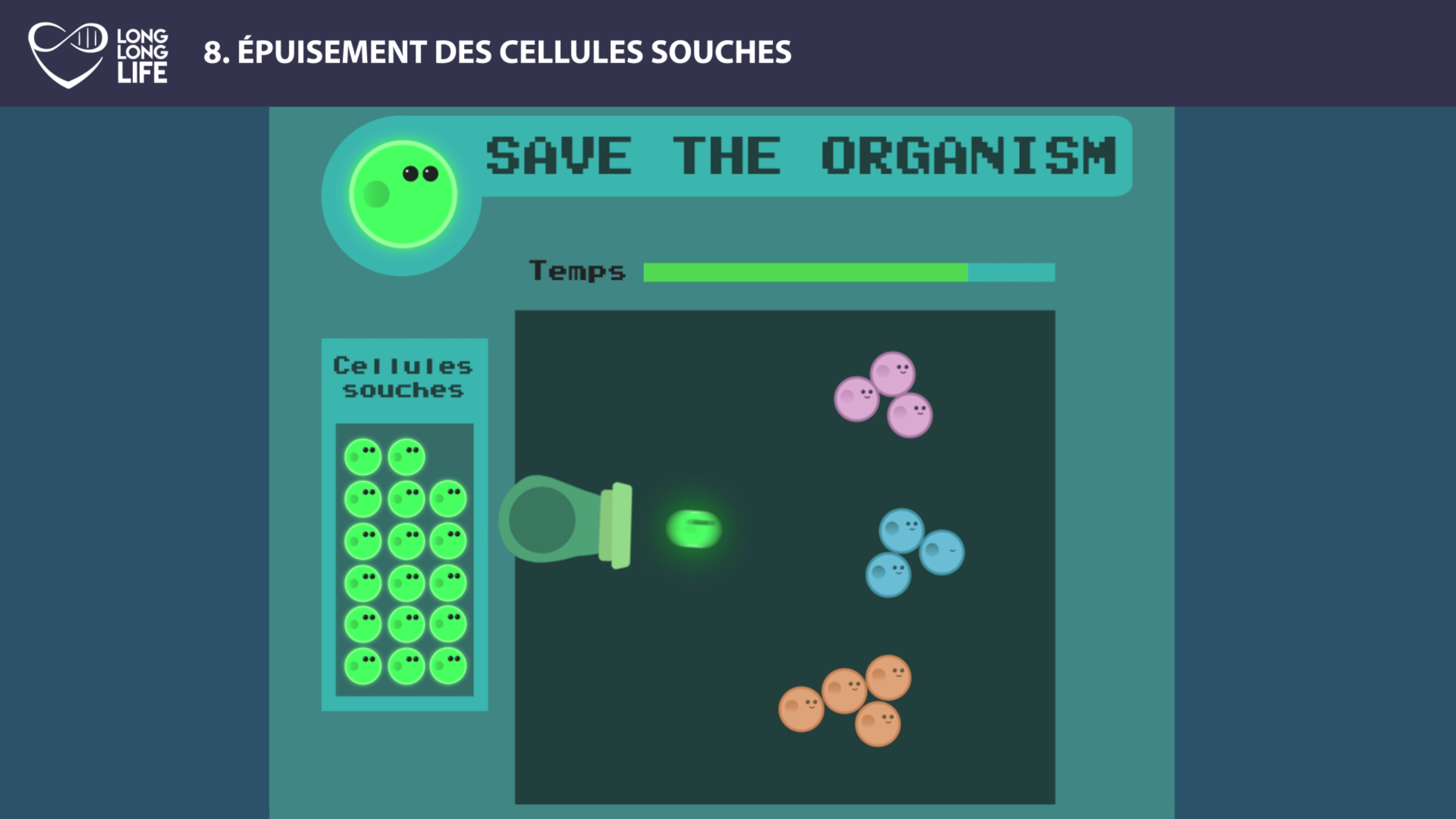
![[Video] The 9 Hallmarks of Aging, Episode 9, Inflammation [FINAL] – with Guilhem Velvé Casquillas PhD](https://www.longlonglife.org/wp-content/uploads/2019/05/Inflammation-Long-Long-Life-longévité-vieillissement-transhumisme-inflammaging-1-218x150.png)
![[Video] The 9 Causes of Aging, Episode 8, Stem Cells – with Dr. Guilhem Velvé Casquillas cellules souches long long life transhumanisme longévité vieillissement arcade](https://www.longlonglife.org/wp-content/uploads/2019/05/cellules-souches-long-long-life-transhumanisme-longévité-vieillissement-arcade-218x150.png)
![[Video] – The 9 Causes of Aging, Episode 7, Senescence – with Dr. Guilhem Velvé Casquillas sénescence long long life longévité transhumanisme vieillissement cellules sénescentes](https://www.longlonglife.org/wp-content/uploads/2019/05/sénescence-long-long-life-longévité-transhumanisme-vieillissement-cellules-sénescentes-1-218x150.png)
![[Video] – The 9 Causes of Aging, Episode 6, Nutrient Detection – with Dr. Guilhem Velvé Casquillas nutriments 1 long long life transhumanisme longévité vieillissement](https://www.longlonglife.org/wp-content/uploads/2019/05/nutriments-1-long-long-life-transhumanisme-longévité-vieillissement-218x150.png)
![[Video] The 9 Hallmarks of Aging, Episode 5, Mitochondria – with Dr. Guilhem Velvé Casquillas mitochondria long long life longevity transhumanism aging free radicals (2)](https://www.longlonglife.org/wp-content/uploads/2019/07/mitochondria-long-long-life-longevity-transhumanism-aging-free-radicals-2-218x150.png)
![[Video] Eurosymposium on Healthy Ageing, Brussels, 2018 Eurosymposium on Healthy Aging](https://www.longlonglife.org/wp-content/uploads/2019/07/P1310252-218x150.jpg)
![[Video] The 9 Causes of Aging, Episode 4, Poorly Folded Proteins – with Dr. Guilhem Velvé Casquillas protéine long long life 9 causes du vieillissement longévité transhumanisme](https://www.longlonglife.org/wp-content/uploads/2019/05/protéine-long-long-life-9-causes-du-vieillissement-longévité-transhumanisme-218x150.png)

![[Video] The 9 Hallmarks of Aging, Episode 2, Telomere shortening – Guilhem Velvé Casquillas, PhD Télomère - Long Long Life 9 causes du vieillissement longévité transhumanisme](https://www.longlonglife.org/wp-content/uploads/2019/06/Télomère-Long-Long-Life-9-causes-du-vieillissement-longévité-transhumanisme-1-218x150.png)
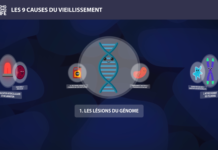

![[Video] – The 9 Causes of Aging, Episode 7, Senescence – with Dr. Guilhem Velvé Casquillas sénescence long long life longévité transhumanisme vieillissement cellules sénescentes](https://www.longlonglife.org/wp-content/uploads/2019/05/sénescence-long-long-life-longévité-transhumanisme-vieillissement-cellules-sénescentes-1-324x160.png)
